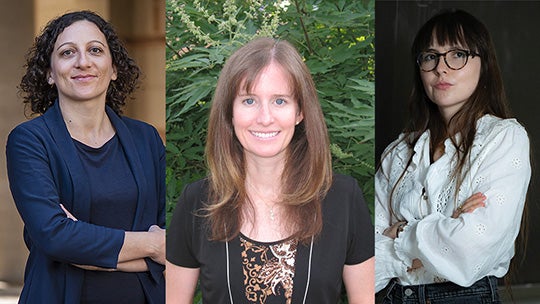From hosting speakers on topics ranging from curanderas in Mexican-American literature, the meaning of oil in Venezuela and the archaeology of the Amazon to fostering events on the arts in Guyana and contributing to student events, Rice University’s Initiative for the Study of LatinX America (ISLA) has accomplished a lot in the past three years. With the goal of combining Latin American and U.S. Latino studies in a way that is transnational, multiracial and multilingual, ISLA has brought the Rice community together via a monthly research colloquium, conferences and a lecture series that showcases the newest research in the field from speakers who examine the effects of armed conflict on forest environments in Colombia as well as experts who read Latinx literature in relation to the UNESCO heritage sites of the slave routes in West Africa.

“Latin American and Latinx studies are such rich and insightful fields,” said Sophie Esch, an associate professor of modern and classical literatures and cultures and director of ISLA. “I want people to know more about Latin American studies and Latin American concepts, to understand them as tools to understand other regions and cultures as well as their own cultures.”
ISLA is now evolving into Rice’s Center for Latin American and Latinx Studies, heralding a new era of academic inquiry and engagement and addressing a longstanding gap in Rice’s scholarly landscape, while also embodying a commitment to innovative and inclusive approaches to area and ethnic studies.
‘Increase visibility’
“We created ISLA with the aim of magnifying and strengthening Latin American and Latinx studies at Rice, so that Rice becomes an institution known for exploring Latin American and Latinx studies in a very forward-looking way,” said Esch, who will lead the new center.
She spearheaded ISLA, which has united a diverse community of faculty, students and staff to explore the multifaceted dimensions of Latin American cultures, histories and societies. Supported by the Department of Modern and Classical Literatures and Cultures, the dean of humanities and the provost, ISLA embodies Rice’s commitment to fostering interdisciplinary engagement and intellectual exchange.
"Now with the creation of the Center for Latin American and Latinx studies, these activities will jump into high gear,” Esch said. “Our aim with the center is to increase visibility, foster top-notch research and engage in collaborative knowledge creation.”
Esch also stressed that the center aims to be a point of identification and pride of the Latin American and Latine faculty, staff and student population, while at the same time bringing knowledge and expertise about the region and its diverse peoples and cultures to the entire scholarly community.
“The center aims to concentrate new attention on exciting research, course offerings and community initiatives in fields of study that have long existed at Rice, dispersed across campus in various disciplines and schools,” said Kathleen Canning, Rice’s dean of humanities and the Andrew W. Mellon Professor of History. “The founding of the center brings Rice into closer communication and collaboration with the Latin American and Latinx populations in Houston, the Gulf Coast and neighboring countries in Latin America.”
“It alters the scope of the things that we can do as well as how we can imagine doing research and building community across campus,” said Laura Correa Ochoa, assistant professor of history.
Correa Ochoa has been part of the primarily faculty-led initiative for the center, along with Esch and Leslie Schwindt-Bayer, the Thomas Cooke and Mary Elizabeth Edwards Chair in Government and Democracy and professor of political science.
“For the past three years, we’ve been talking about this, thinking about this and trying to envision what it could look like,” Schwindt-Bayer said. “We invested a lot of time and effort, so it’s really exciting to see it come to fruition.”
Esch, whose research on Latin America has won multiple awards, called the formation of the center a key step for Rice’s global vision and commitment to Houston.
“Given what Rice is — the quality, prestige and location of the institution in Houston — I think it’s really important to have this center because it gives us a connection to a region that is right on our doorstep,” Schwindt-Bayer said.
‘The history is here’
Houston, renowned for its cultural diversity, is an ideal locale for the Center for Latin American and Latinx Studies. The region’s rich history marked by the successive presence of indigenous people and the Spanish empire underscores its deep-rooted connections to Latin America.
“It’s not across the border; the history is here,” Esch said.
Houston’s proximity to the nation’s southern border offers a geographical advantage with unparalleled opportunities to strengthen connections with Latin America, facilitating academic exchange, cultural engagement and collaborative initiatives.
“Rice is in such a strategic location in Houston,” Schwindt-Bayer said. “We can take advantage of that to better connect with Latin America and build out the Latinx component of the center.”
‘Move the field forward’
At a time when Latin American and Latinx communities are increasingly interconnected and facing complex challenges, the center’s innovative approach offers a platform for holistic inquiry and engagement.
“Historically, Latin American and Latinx studies have been separate fields,” Correa Ochoa said, explaining that Latin American studies has a very particular genealogy. It was part of a broader turn to area studies in the context of the Cold War and decolonization struggles in Africa, the Caribbean and Asia. Latinx studies, on the other hand, has gained greater visibility in recent decades and can be traced to the struggles of Latinx populations in the U.S., including those of the Chicano and Puerto Rican liberation movements.
Led by a recognition of evolving realities, the center seeks to address the pressing need for interdisciplinary collaboration and nuanced understanding of Latin American and Latinx cultures and societies. By bridging historically separate fields of study, the center aims to facilitate dialogue and collaboration, transcending traditional disciplinary boundaries.
“The center gives us an opportunity to branch out beyond the humanities and better connect with faculty who are doing work on Latinx studies and Latin American studies all over campus,” Correa Ochoa said.
“Many questions that move the field forward happen in the dialogue and collaboration between different fields,” Esch said.
"I’m excited to see this recognition of the importance of developing Latin American and Latinx studies here at Rice, which will help facilitate collaborations between the schools of humanities and social sciences and beyond,” said Rachel Tolbert Kimbo, Rice’s dean of social sciences.
The ‘starting point’
In its first five years, the center will prioritize three key research clusters, each addressing pressing issues throughout Latin America.
The first cluster focusing on threats to democracy aims to understand and confront the escalating challenges to democratic governance in the region. From overt acts such as coups and election fraud to subtler erosions of democratic institutions, the center seeks to explore the consequences of these threats and promote collaboration across disciplines to strengthen democratic resilience and challenge biased narratives.
Inequality, representation and migration constitute the second research cluster, delving into the persistent racial, ethnic, gender and class-based inequalities prevalent in the Americas. With a focus on marginalized populations such as Black and Indigenous peoples, women and LGBTQ communities, the center aims to document their struggles, analyze their challenges and explore avenues for greater representation and social justice. This cluster seeks to understand and address the root causes of displacement and discrimination in a collaborative and ethical manner.
The conflict and environmental change cluster grapples with the escalating challenges and conflicts triggered by natural and man-made disasters across the Americas. From Houston’s petrochemical industries to the Amazon’s deforestation, the center endeavors to comprehend and visualize these complex issues, drawing upon insights from the humanities, social and natural sciences, engineering and the arts to facilitate innovative solutions and foster resilience in the face of environmental change.
“These clusters are the starting point, but we believe they will change over time,” Esch said. “As a center, we will be very agile in terms of adapting to different research needs and aspects.”
‘Grow from there’
As ISLA evolves into the Center for Latin American and LatinX Studies, Esch said it has transformative potential. She envisions the center as a dynamic hub that not only builds academic community but also fosters broader community involvement in Houston, the Gulf Coast region and across the Americas.
“The hope is that once you have the center to bundle everything, it can grow from there,” Esch said.
Schwindt-Bayer echoed that sentiment, advocating for the integration of Latinx and Latin American studies into the fabric of higher education. She also emphasized the importance of institutions like Rice taking a proactive stance on these issues, not only as a means of academic enrichment but also as a strategic advantage in recruiting faculty, graduate students and undergraduates.
“We are hiring two new scholars in the field whose cutting-edge research and teaching will elevate the visibility and excellence of the center,” Canning said.
With the backing and resources provided by the university, the center has the capacity to become a driving force for academic creativity, fostering fresh avenues for community involvement and establishing a dynamic interdisciplinary route for Rice students. This pathway will seamlessly connect Latin American studies with the exploration of Latino/Latinx cultures and communities within the United States. By nurturing meaningful dialogue, the center will play a crucial role in shaping a future where Latinx and Latin American studies are not only integral to academic discourse at Rice but also to societal advancement overall.

